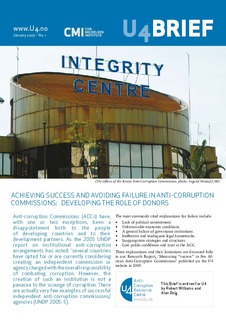| dc.contributor.author | Williams, Robert | |
| dc.contributor.author | Doig, Alan | |
| dc.date.accessioned | 2018-01-04T08:15:49Z | |
| dc.date.available | 2018-01-04T08:15:49Z | |
| dc.date.issued | 2007-10-05 | |
| dc.identifier | oai:www.cmi.no:2749 | |
| dc.identifier.citation | Bergen: Chr. Michelsen Institute (U4 Brief 2007:1) 4 p. | |
| dc.identifier.uri | http://hdl.handle.net/11250/2474545 | |
| dc.description.abstract | Anti-corruption Commissions (ACCs) have, with one or two exceptions, been a disappointment both to the people of developing countries and to their development partners. As the 2005 UNDP report on institutional anti-corruption arrangements has noted: ‘several countries have opted for or are currently considering creating an independent commission or agency charged with the overall responsibility of combating corruption. However, the creation of such an institution is not a panacea to the scourge of corruption. There are actually very few examples of successful independent anti-corruption commissions/ agencies' (UNDP 2005: 5). | |
| dc.language.iso | eng | |
| dc.publisher | Chr. Michelsen Institute | |
| dc.relation | U4 Brief | |
| dc.relation | 2007:1 | |
| dc.relation.ispartof | U4 Brief | |
| dc.relation.ispartofseries | U4 Brief 2007:1 | |
| dc.relation.uri | https://www.cmi.no/publications/2749-achieving-success-and-avoiding-failure-in-anti | |
| dc.subject | Corruption | |
| dc.subject | Anti-Corruption Conventions | |
| dc.subject | Commissions | |
| dc.title | Achieving Success and Avoiding Failure in Anti-Corruption Commissions: Developing the Role of Donors | |
| dc.type | Report | |
